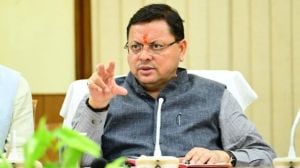Quick Ascent
With 90 per cent Muslim voters, Dhing is a test case for the newly floated AUDF. Playing the minority card here involves delivering the goods or going the Congress way

Hafiz Ataur Rahman, in his 50s, who is in charge of the 15-year-old Anwarul Ulema Madarsa at Khairamari, 25 km from the district headquarters of Nagaon, has seen several MLAs come and go. And it8217;s always spun on an interesting equation this Central Assam Assembly constituency 8212; more than 90 per cent of the voters here are Muslims.
8216;8216;They the MLAs hardly did anything except for helping their near and dear ones and creating a class of dalals brokers. And when it came to addressing basic issues like health or education, they simply disappear after making tall promises,8217;8217; says Rahman. This is why, he says, this time, the people of this constituency decided to elect the candidate fielded by the Assam United Democratic Front AUDF, a party floated six months ago by perfume tycoon Badruddin Ajmal.
Ajmal8217;s candidate Mobarak Ali Pathan won from Dhing with a margin of 2,545 votes over his nearest Congress candidate and sitting MLA Idris Ali. 8216;8216;Pathan was a candidate of the common Muslim voter here, one who has been not just neglected, but also discriminated in all possible ways even by past MLAs from the same community,8217;8217; adds Rahman, taking time off from his 150-plus class in the madarsa. 8216;8216;We are fed up with the Congress. Initially, they signed an accord with the AASU in 1985 and pushed us into a situation where we were almost exposed to harassment in the name of identification of Bangladeshi migrants. Last year, it was the same Congress that watched helplessly as the IMDT Act was scrapped by the Supreme Court,8217;8217; Muhibul Islam, a farmer, chips in.
So when 13 Muslim organisations came together under the auspices of the state Jamiat Ulema-e-Hind after the IMDT Act was scrapped in July last year and formed the AUDF, it was just the conglomeration a large number of religious minorities 8212; all of whom have roots either in erstwhile East Bengal or erstwhile East Pakistan 8212; could fall back on.
8216;8216;The common man in our community does not understand what the Congress means by amending the Foreigners Act. The end of the IMDT Act means the end of our security,8217;8217; says Abdul Aziz 57, another farmer.
8216;8216;The police haven8217;t come looking for Bangladeshis among us just yet but you never know. Assam has a history of Muslims facing more harassment during Congress rule,8217;8217; points out Pathan, the newly-elected MLA from here.
Pathan was never in the Congress, nor was Badruddin Ajmal. 8216;8216;Instead, I was in the AGP since it was born in 1985, because I had a liking for Mahanta,8217;8217; he says.
Pathan8217;s proximity to Ajmal, however, has been for a different reason. While Ajmal has been the Assam unit president of the Jamiat Ulema-e-Hind, Pathan has been its district secretary for long. 8216;8216;Moreover, Mufti Khairul Islam, the aamir-e-shariat topmost Muslim religious leader of the Northeastern region also hails from this area,8217;8217; says Rahman. 8216;After all, the Jamiat and the aaamir-e-shariat are more important than the Congress for every Muslim,8217;8217; adds Pathan.
So when the perfume tycoon floated the AUDF, he had the backing of religious clerics who took the message across to the voters. Reports say there were election meetings in the madarsas and mosques but Pathan denies them. 8216;8216;Such things are not allowed by the Election Commission,8217;8217; he says.
That the constituency was lagging behind and the voters felt the Congress was to blame helped too. 8216;8216;There is not even one 30-bed hospital in this constituency. The one at Dhing town is under Batadrva constituency. We have only 10 primary schools and two high schools in the entire constituency which has over 1.5 lakh voters and nearly 2.2 lakh people,8217;8217; says Pathan, adding the picture is no different in Muslim-dominated areas across the state.
The result: AUDF won 10 seats, came second in at least 12 seats and contributed to the defeat of the Congress in 20 more seats. One man differed. 8216;8216;I don8217;t give a damn to Ajmal8217;s AUDF,8217;8217; Chief Minister Tarun Gogoi said once the results were out. He might do a rethink: at least 39 of Assam8217;s 126 Assembly segments have more than 40 per cent Muslim voters, while 12 have Muslim voters between 30 and 40 per cent.
samudra.kashyapexpressindia.com
- 01
- 02
- 03
- 04
- 05































